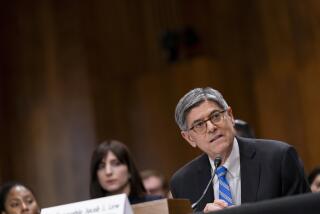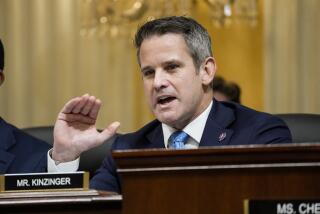Cohen Gets Senate OK, Vows Exit From Bosnia
WASHINGTON — William S. Cohen was unanimously confirmed as secretary of Defense on Thursday after unequivocally promising his former Senate colleagues that U.S. forces would be out of Bosnia in 18 months.
Describing his words as a “very strong signal for our European friends,” the former Republican senator declared at his confirmation hearing: “We are not going to be there. This is going to end at that point.”
By a vote of 99 to 0, the Senate confirmed Cohen as the 20th Defense secretary--and the first Republican to serve a Democrat in the post--only minutes after his confirmation hearing. By the same margin, the Senate also confirmed Madeleine Albright to succeed Warren Christopher and become the first woman to be secretary of State.
In announcing the deployment of 8,500 troops to Bosnia last month, President Clinton said that the unit’s mission “will last 18 months.”
Cohen’s ringing declaration seemed to leave no wiggle room for the administration and to make it difficult to change course later.
It would not be the first time, however. William J. Perry, Cohen’s predecessor as Defense secretary, had flatly asserted for most of last year that U.S. troops would be out by the end of the year, only to have Clinton decide to maintain a U.S. presence in the international peacekeeping force that remains in Bosnia.
“I made a categorical prediction before, and it turned out to be wrong,” Perry said in an NBC-TV interview.
In an amicable hearing of the Senate Armed Services Committee, on which Cohen served during all of his 18 years in the Senate, committee members questioned him repeatedly about the administration’s intentions in Bosnia.
Sen. John McCain (R-Ariz.), one of Cohen’s closest friends on the committee, told his former colleague that he was “upset” that the administration had joined an international follow-on force last month after declaring a year earlier that its first-stage peacekeeping force would remain in the battered Balkan state only one year.
McCain said he was worried that the U.S. forces would be assigned to stay longer than 18 months in Bosnia if America’s European allies proved unwilling to field another follow-on peacekeeping force.
Cohen, however, insisted that the administration is putting out a “very strong message that the American people are not going to have their forces deployed in that region.”
“It was principally a European problem to be solved . . . “ Cohen said. “It’s time for them to assume responsibility.”
He said one of the first things he would do after his confirmation is “to make a trip to visit with our European friends and to indicate the strong feelings we have about it.” And he said he expects the peacekeeping forces to “come down significantly in the next six months to a year and that we would be out by the end of that 18 months.”
The White House said Cohen’s language was, in the words of one aide, “totally consistent” with Clinton’s statements on the issue.
In his three terms in the Senate, Cohen was known as a consistent advocate of increased defense spending. In his new job, he will preside over a Pentagon whose budget will be flat or even in decline.
In a response to written questions from the committee, Cohen said he believes that the Pentagon no longer can put off spending for a modern armed forces, even if that means cutting back on personnel or materiel.
“I worry that the department has maintained force structure and readiness but has deferred modernization to near the breaking point,” he said.
The Pentagon is now going through a systematic review of its spending options, and it is expected to reach conclusions in late spring.
Cohen said he is going to give more intense focus to U.S. security relations in Asia, just as the White House is talking about focusing more on diplomatic relations with nations of that continent.
In addition to the threat from North Korea, he said, “our interests are potentially jeopardized by the danger of instability and rivalry among major regional powers.” He said maintaining forces in the region, and “expanding our security engagement in the region are indispensable to preserving stability.”
Clinton called the Senate’s quick votes on Albright and Cohen “a strong signal to the world of its determination to work in a constructive and bipartisan spirit with the administration on our nation’s foreign policy and national defense.”
Albright, 59, who has served as ambassador to the United Nations, told reporters in New York that her confirmation “signals a new era of bipartisan foreign policy, and I can’t wait to get started.”
More to Read
Get the L.A. Times Politics newsletter
Deeply reported insights into legislation, politics and policy from Sacramento, Washington and beyond. In your inbox three times per week.
You may occasionally receive promotional content from the Los Angeles Times.











